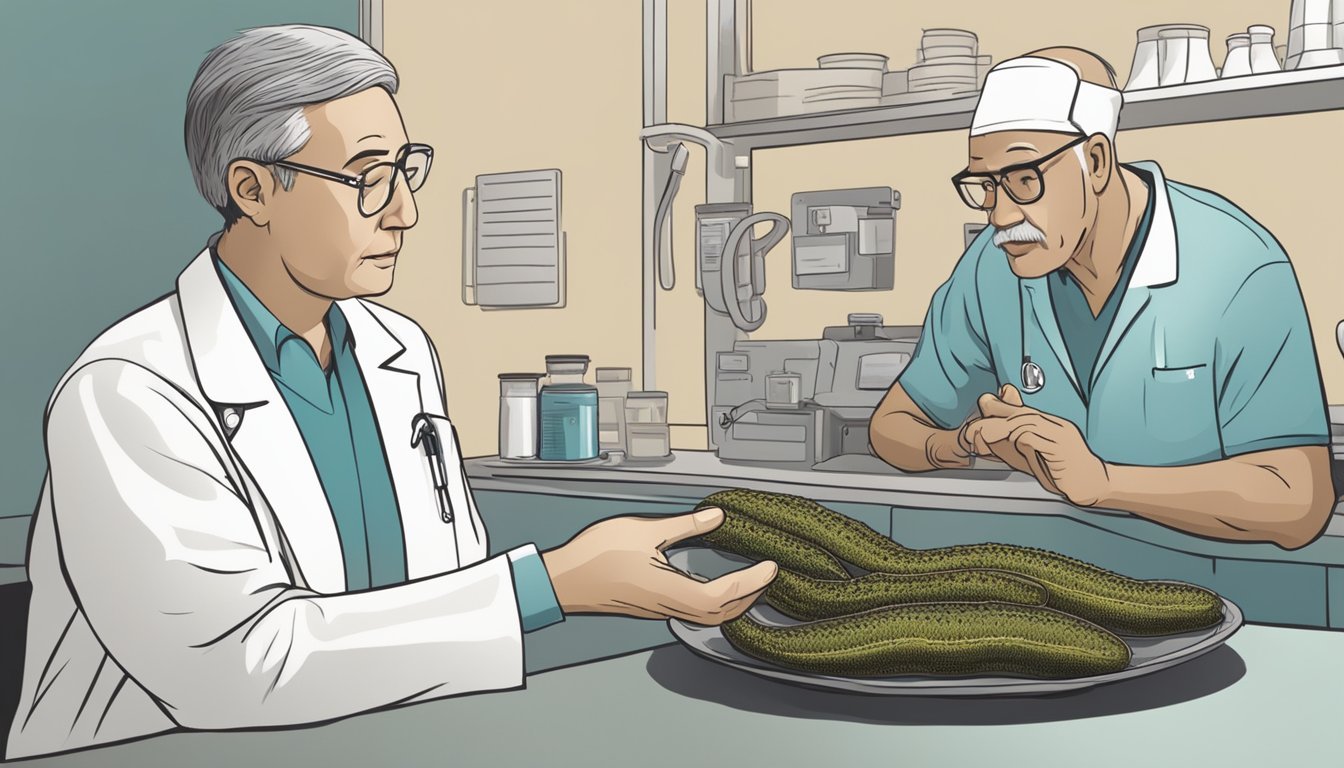Can Diabetics Eat Sea Cucumbers?
Health Benefits and Considerations
For individuals managing diabetes, diet and lifestyle choices are crucial. Sea cucumbers, specifically Holothuria scabra, are gaining attention not just for their culinary uses but for their potential health benefits. Recent studies indicate that these marine delicacies might offer significant advantages for those with diabetes.
Sea cucumbers may help delay the onset of type 2 diabetes and reduce related complications. This marine species is low in carbohydrates and rich in nutrients, making it a valuable addition to a diabetic-friendly diet. Moreover, their unique bioactive compounds could contribute to better blood sugar control and overall metabolic health.
Incorporating sea cucumbers into meals could provide diabetics with both variety and nutritional benefits. As always, it's important to consult with healthcare providers before making significant changes to one's diet. Exploring the benefits of sea cucumbers could lead to an exciting and healthful addition to a diabetes management plan.
Understanding Diabetes
Diabetes is a chronic condition affecting millions worldwide, characterized primarily by high blood sugar levels. This section covers the biological underpinnings of diabetes and effective strategies for managing type 2 diabetes, with a focus on insulin resistance and blood sugar control.
The Biology of Diabetes
Diabetes, particularly type 2 diabetes, arises when the body experiences insulin resistance. Insulin, a hormone produced by the pancreas, helps cells take in glucose from the bloodstream. When cells become resistant, glucose accumulates in the blood.
Blood sugar levels must be constantly monitored in diabetics. Elevated blood sugar can lead to complications like cardiovascular disease and nerve damage. Type 2 diabetes typically progresses gradually, often diagnosed later in life. The causes are multi-faceted, considering both genetic and lifestyle factors such as diet and physical activity.
Managing Type 2 Diabetes
Proper management includes monitoring blood sugar levels, maintaining a balanced diet, and regular physical activity. Diet changes can play a crucial role, with an emphasis on foods that do not spike blood sugar.
Medications like metformin are often prescribed to aid in blood sugar control. For those with severe insulin resistance, insulin therapy might be required. Lifestyle interventions, including weight loss and stress reduction, are equally important.
Dietary choices are a key component, and incorporating foods with a low glycemic index can be beneficial. Regular check-ups with healthcare providers ensure that any diabetes-related complications are detected and treated early.
Nutritional Profile of Sea Cucumbers
Sea cucumbers are valued for their high protein content and low fat, making them a nutritious option. They also contain various vitamins, minerals, and bioactive compounds beneficial to health.
Key Nutrients Found in Sea Cucumbers
Sea cucumbers are rich in proteins, with most species comprising 41-63% protein. This high protein content supports muscle repair and growth.
They are low in calories and fats, making them a diet-friendly choice. Essential amino acids found in sea cucumbers contribute to overall health, enhancing immune function and maintaining tissue health.
Collagen is another significant component, promoting skin elasticity and joint health.
Sea cucumbers also provide minerals like calcium, magnesium, and zinc, which are crucial for bone health, metabolic function, and immune support.
Vitamin E and B vitamins are present, supporting skin health and energy production. Additionally, they contain omega-3 fatty acids, which are beneficial for heart health and reducing inflammation.
Comparison With Other Seafood
Compared to other seafood, sea cucumbers offer a unique nutritional profile. While many fish are also high in protein, sea cucumbers stand out for their particularly high protein percentage and low-fat content.
Unlike oily fish such as salmon, which are high in fats, sea cucumbers are a leaner option. They provide similar omega-3 fatty acid benefits without the extra calories from fats.
In terms of minerals, fish like salmon and tuna are rich in elements like selenium and iodine, but sea cucumbers offer a broader spectrum of minerals, including higher amounts of calcium and magnesium.
Collagen content in sea cucumbers is higher than in most fish, making them an excellent choice for those seeking to improve skin and joint health.
Health Benefits of Sea Cucumbers
Sea cucumbers offer a variety of health benefits, including potential medicinal properties and roles in heart disease and cancer prevention. Their anti-inflammatory and antioxidant effects contribute to their status as a valuable functional food.
Medicinal Properties
Sea cucumbers contain various bioactive compounds that may have medicinal benefits. They are rich in vitamins and minerals, such as Vitamin B1 (thiamine) and Vitamin B2 (riboflavin), which can help treat metabolic disorders and support a healthy appetite.
They are also known for their high protein content, with some species comprising up to 63% protein. This high protein content makes them a nutritious addition to the diet. Additionally, studies suggest that sea cucumbers might help delay the onset of type 2 diabetes and its complications.
Role in Heart Disease and Cancer Prevention
Sea cucumbers may play a role in preventing heart disease by reducing cholesterol levels. The consumption of sea cucumbers has been associated with improved heart health markers, possibly due to their low-fat and high-protein profiles, which are essential for cardiovascular health.
Moreover, sea cucumbers are believed to have cancer-fighting properties. They contain compounds that can act against cancer cells, potentially inhibiting growth and spreading. This is attributed to their bioactive components, which have shown promise in preliminary studies.
Anti-Inflammatory and Antioxidant Effects
One of the standout features of sea cucumbers is their anti-inflammatory and antioxidant properties. These effects are largely due to their rich content of antioxidants and other beneficial compounds.
The antioxidants in sea cucumbers help neutralize harmful free radicals in the body, reducing oxidative stress. This can have numerous health benefits, including slowing the aging process and reducing inflammation.
In addition, the anti-inflammatory properties help in managing conditions where inflammation is a significant concern. This makes sea cucumbers potentially beneficial for a variety of inflammatory diseases.
Sea cucumbers, therefore, serve as a functional food that can provide targeted health benefits when included in a balanced diet.
Sea Cucumbers in Diabetic Diet
Sea cucumbers have shown promising potential in managing diabetes, mainly through their impact on blood sugar levels and glycation processes. Incorporating them into a diabetic meal plan could offer benefits due to their unique nutritional properties.
Impact on Blood Sugar Levels
Sea cucumbers can influence blood sugar levels positively. Studies have indicated that specific compounds in sea cucumbers help regulate glucose metabolism in the body. These marine animals are low in carbohydrates, making them a suitable option for those seeking to maintain steady blood sugar levels.
Furthermore, sea cucumbers are rich in fiber, which aids in slowing the absorption of sugars. This slower absorption helps to prevent spikes in blood glucose. Including sea cucumbers in the diet might provide better blood sugar control for diabetics.
Glycation and Diabetic Complications
One of the complications of diabetes is glycation, where sugar molecules bind to proteins, forming Advanced Glycation End-products (AGEs). AGEs contribute to various diabetic complications like neuropathy and cardiovascular diseases.
Research has shown that processed dried sea cucumbers with salt extracts and collagen can significantly inhibit the formation of AGEs. By reducing glycation, sea cucumbers may help in delaying or preventing diabetic complications. This positions them as a functional food product with medicinal benefits beyond basic nutrition.
Incorporating Sea Cucumbers into a Diabetic Meal Plan
Incorporating sea cucumbers into a diabetic meal plan involves a few considerations. Due to their low carbohydrate content, they fit well into a low-carb diet. They can be served in various ways, such as in soups, salads, or as a part of a main dish.
For example, a simple sea cucumber soup can be made by simmering them with vegetables and a low-sodium broth, providing a nutritious and diabetes-friendly meal. When adding sea cucumbers to a diet, it’s important to balance them with other healthy foods and consult with a healthcare provider to ensure they fit well into one’s specific meal plan.
Sea cucumbers offer a unique and beneficial addition to a diabetic diet, owing to their effects on blood sugar regulation and the reduction of glycation.
Preparation and Consumption
Sea cucumbers, known for their medicinal properties, can be a nutritional addition to a diabetic-friendly diet. It is crucial to consider proper preparation methods and safety guidelines.
Processed Dried Sea Cucumber
Processed dried sea cucumber is a popular way to consume this marine delicacy. Preparation involves rehydrating it by soaking in water for several hours, then boiling until soft. This method helps preserve its nutritional content, including proteins and collagen.
When preparing, ensure the skin is thoroughly cleaned to remove any residual salt extracts. Adding sea cucumbers to salads or stir-fries with nonstarchy vegetables enhances their nutritional profile. This provides a balanced dish with the benefits of sea cucumbers without the risk of high sugar content.
Safety and Dietary Considerations
While sea cucumbers are beneficial, it's important for diabetics to consider safety and dietary considerations. Some processed sea cucumbers may contain added salt extracts, which could be detrimental in large quantities. Always check for added ingredients.
In terms of nutrition, sea cucumbers are low in fat and high in nutrients, making them a diabetic-friendly option. However, some individuals may have allergies or food sensitivities, so it is advisable to consult with a healthcare provider before incorporating them into one's diet.
Maintain a balanced diet by pairing sea cucumbers with nonstarchy vegetables to keep meals satisfying and healthy.
Research and Expert Opinions
Recent studies highlight sea cucumbers' potential in preventing diabetes, focusing on their bioactive compounds and their effects on the bloodstream.
Studies Conducted by the University of South Australia
The University of South Australia has led research on sea cucumbers' effects on diabetes.
Animal studies have shown that processed dried sea cucumber with salt extracts can inhibit Advanced Glycation End-products (AGEs). These AGEs are linked to the complications of diabetes.
The research results were published in the Journal of Medicinal Plant Research, noting significant reductions in sugar-related metabolites. This finding could pave the way for new dietary recommendations for diabetics.
The study underscores the importance of bioactive compounds present in sea cucumbers. Researchers are hopeful these findings can help in delaying the onset of type 2 diabetes.
Understanding Bioactive Compounds in Sea Cucumbers
Bioactive compounds in sea cucumbers, such as those in the species Holothuria scabra (commonly known as sandfish), play a crucial role in managing diabetes.
These compounds include unique metabolites that have shown promising effects in animal studies.
Bioactive peptides reduce oxidative stress and improve insulin sensitivity by acting directly on sugar-related metabolites.
Research highlights that the effective compounds are more concentrated in processed forms of sea cucumber.
Experts suggest that incorporating sea cucumber in diets might benefit individuals predisposed to diabetes, improving their bloodstream’s response to sugar.
Risk Factors and Detrimental Aspects
While sea cucumbers present potential benefits for diabetics, certain risks and negative aspects should be considered. These include potential allergic reactions, contaminants in the marine environment, and the need to monitor and moderate intake due to varying nutritional content.
Potential for Allergic Reactions and Contaminants
Sea cucumbers, like other marine products, can cause allergic reactions in some individuals. Allergies to sea cucumbers may manifest as skin rashes, swelling, or respiratory issues.
Contaminants are another concern. Sea cucumbers can accumulate heavy metals and other pollutants from their environments. Consuming contaminated products can pose health risks, especially for those with compromised conditions such as diabetes.
It's vital to source sea cucumbers from reputable suppliers who test for pollutants. Awareness of these risks is crucial to mitigating potential health problems.
Monitoring and Moderating Intake
The nutritional content of sea cucumbers warrants careful moderation. While sea cucumbers are typically low in fats, they can contain varying levels of salt and other compounds due to processing methods.
For diabetics, it's important to avoid products with high salt extracts, which can affect blood pressure and overall health. Additionally, monitoring for cholesterol and saturated fat content is essential. Foods high in these components can contribute to heart disease, which is a common complication for diabetics.
Balanced consumption, alongside guidance from healthcare professionals, ensures that benefits are maximized while risks are minimized.
Consulting Healthcare Providers
Individuals with diabetes should always consult their healthcare provider before incorporating new foods, like sea cucumbers, into their diet. Healthcare professionals can provide tailored advice based on the patient's specific health needs and current treatment plan.
Doctors usually review the overall diet and may offer insights into how sea cucumbers could fit into a balanced meal plan. It's essential to discuss any potential interactions with existing medications or treatments.
The American Diabetes Association recommends regular check-ups and consultations for patients managing diabetes. During these visits, patients can ask about adding sea cucumbers to their diet and whether it aligns with their treatment goals.
Before making dietary changes, it's crucial to understand any possible effects on blood sugar levels. Healthcare providers can monitor and adjust medication or dietary recommendations accordingly.
Patients should maintain open communication with their healthcare team. This practice ensures any dietary adjustments, including incorporating sea cucumbers, are safe and beneficial.








